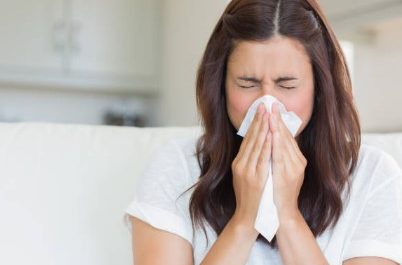A runny nose, also known as rhinorrhea, is a condition characterized by the excessive production and discharge of mucus from the nose. It is a common symptom of various conditions, such as allergies, colds, sinus infections, and nasal congestion.
When the nasal passages are irritated or inflamed, such as during an allergic reaction or viral infection, the body produces excess mucus as a defense mechanism. This excess mucus can result in a runny nose, which may manifest as a clear, watery discharge or a thicker, colored discharge depending on the underlying cause.
Runny nose is often accompanied by other symptoms such as sneezing, nasal congestion, itching, and postnasal drip. It can be bothersome and may cause discomfort, particularly when the mucus runs down the back of the throat or interferes with breathing.
The most common causes of a runny nose include:
Allergies
Allergic rhinitis, commonly known as hay fever, occurs when the immune system overreacts to allergens such as pollen, dust mites, or pet dander.
Common cold
Viral infections, such as the common cold, can cause nasal congestion, sneezing, and a runny nose. Cold symptoms typically resolve within a week or two.
Sinusitis
Inflammation of the sinuses can cause a runny nose, facial pain or pressure, and thick nasal discharge. Sinusitis can be caused by viral or bacterial infections or as a result of allergies.
Environmental irritants
Exposure to irritants like smoke, strong odors, pollutants, or chemicals can trigger a runny nose.
Treatment for a runny nose depends on the underlying cause. Over-the-counter antihistamines, decongestants, saline nasal sprays, and nasal irrigation can help provide relief. However, it’s advisable to consult a healthcare professional if symptoms persist, worsen, or are accompanied by severe pain, fever, or other concerning symptoms.
To stop a runny nose instantly, you can try the following measures:
Blow your nose
Gently blow your nose to clear out any excess mucus. Make sure to use soft tissues and avoid harshly blowing your nose, as it can irritate the nasal passages.
Saline nasal rinse
Use a saline solution to rinse your nasal passages. You can use a saline nasal spray or a neti pot to flush out the mucus and relieve congestion. Follow the instructions provided with the product for proper usage.
Stay hydrated
Drink plenty of fluids, such as water, herbal tea, or clear broths. Staying hydrated can help thin the mucus and make it easier to expel.
Use a humidifier
Use a humidifier or a cool mist vaporizer in your room to add moisture to the air. This can help soothe irritated nasal passages and reduce the discomfort of a runny nose.
Apply a warm compress
Place a warm compress or warm towel over your nose and sinuses for a few minutes. The warmth can help alleviate congestion and promote drainage.
Over-the-counter antihistamines or decongestants
Depending on the cause of your runny nose (such as allergies or a cold), you may consider taking over-the-counter antihistamines or decongestants. These medications can help reduce nasal congestion and control excessive mucus production. However, it’s important to read and follow the instructions on the packaging, and consult a pharmacist or healthcare professional if you have any underlying medical conditions or are taking other medications.
Please note that these measures provide temporary relief and may not address the underlying cause of your runny nose. If your symptoms persist or worsen, it’s advisable to consult a healthcare professional for a proper diagnosis and appropriate treatment.
Example of Over-the-counter antihistamines for runny nose
There are several over-the-counter antihistamines available for relieving a runny nose due to allergies. Some common examples include:
Loratadine (Claritin)
Loratadine is a non-drowsy antihistamine that provides relief from allergy symptoms including a runny nose, sneezing, and itchy, watery eyes.
Cetirizine (Zyrtec)
Cetirizine is another non-drowsy antihistamine that effectively treats allergy symptoms, including a runny nose, itching, and nasal congestion.
Fexofenadine (Allegra)
Fexofenadine is a non-drowsy antihistamine that provides relief from allergy symptoms such as a runny nose, sneezing, and itchy, watery eyes.
Diphenhydramine (Benadryl)
Diphenhydramine is a sedating antihistamine that can help relieve a runny nose and other allergy symptoms. It is known to cause drowsiness, so it is often used in cases where sleep is desired, such as nighttime use.
It’s important to read and follow the instructions on the packaging, as well as any advice from a pharmacist or healthcare professional. They can provide recommendations based on your specific needs and any underlying health conditions or medications you may be taking. If your symptoms persist or worsen, it’s advisable to consult a healthcare professional for further evaluation and guidance.
Example of over the counter decongestants for runny nose
Over-the-counter decongestants can help relieve a runny nose by reducing nasal congestion. Some common examples of over-the-counter decongestants include:
Pseudoephedrine (Sudafed)
Pseudoephedrine is a widely used decongestant that can provide relief from nasal congestion and a runny nose. It works by constricting blood vessels in the nasal passages, reducing swelling and congestion. Sudafed is available in various forms, including tablets, capsules, and nasal sprays.
Phenylephrine
Phenylephrine is another decongestant commonly found in over-the-counter nasal sprays and oral medications. It works by narrowing the blood vessels in the nasal passages, helping to relieve congestion and a runny nose.
It’s important to note that decongestants should be used according to the instructions on the packaging or as advised by a pharmacist or healthcare professional. These medications may have potential side effects and may not be suitable for everyone, particularly those with certain medical conditions, such as high blood pressure, or those taking certain medications.
Conclusion
It’s advisable to consult a healthcare professional or pharmacist before using decongestants, especially if you have any underlying health conditions or if you are taking other medications. They can provide guidance on the appropriate use of decongestants and recommend the best option for your specific situation.


